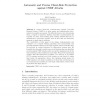Free Online Productivity Tools
i2Speak
i2Symbol
i2OCR
iTex2Img
iWeb2Print
iWeb2Shot
i2Type
iPdf2Split
iPdf2Merge
i2Bopomofo
i2Arabic
i2Style
i2Image
i2PDF
iLatex2Rtf
Sci2ools
150
click to vote
ESORICS
2011
Springer
2011
Springer
Automatic and Precise Client-Side Protection against CSRF Attacks
A common client-side countermeasure against Cross Site Request Forgery (CSRF) is to strip session and authentication information from malicious requests. The difficulty however is in determining when a request is malicious. Existing client-side countermeasures are typically too strict, thus breaking many existing websites that rely on authenticated cross-origin requests, such as sites that use third-party payment or single sign-on solutions. The contribution of this paper is the design, implementation and evaluation of a request filtering algorithm that automatically and precisely identifies expected cross-origin requests, based on whether they are preceded by certain indicators of collaboration between sites. We formally show through bounded-scope model checking that our algorithm protects against CSRF attacks under one specific assumption about the way in which good sites collaborate cross-origin. We provide experimental evidence that this assumption is realistic: in a data set of...
| Added | 20 Dec 2011 |
| Updated | 20 Dec 2011 |
| Type | Journal |
| Year | 2011 |
| Where | ESORICS |
| Authors | Philippe De Ryck, Lieven Desmet, Wouter Joosen, Frank Piessens |
Comments (0)

